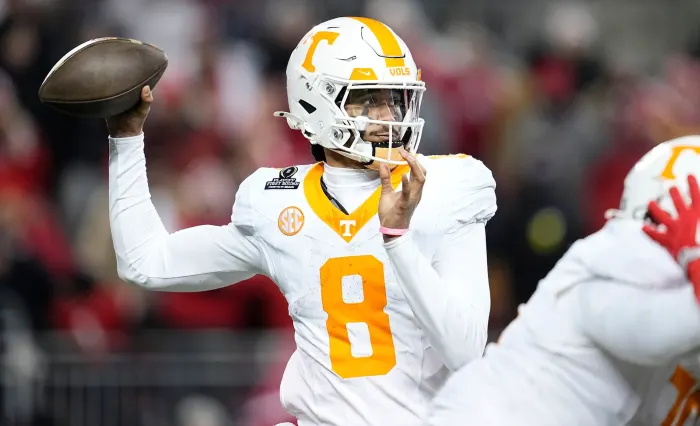 Tennessee Vols fans are dealing with some unexpected spring drama thanks to a report from On3’s Pete Nakos on Thursday that states that quarterback Nico Iamaleava is currently negotiating a new NIL deal with UT (Iamaleava’s father refuted the report late Thursday night).
Tennessee Vols fans are dealing with some unexpected spring drama thanks to a report from On3’s Pete Nakos on Thursday that states that quarterback Nico Iamaleava is currently negotiating a new NIL deal with UT (Iamaleava’s father refuted the report late Thursday night).
On Friday morning, VolQuest’s Brent Hubbs (the go-to insider for UT athletics) joined 104.5 The Zone’s Ramon, Kayla, and Will to discuss Iamaleava situation.
The crux of Hubbs’ conversation with show hosts Will Boling, Kayla Anderson, and Ramon Foster centered around the possibility that Tennessee fans may never know the actual details of Iamaleava’s NIL contract, or whether he receives a new deal ahead of the 2025 season.
“What we know is that Nico’s going to go through the spring game tomorrow (April 12),” said Hubbs. “Obviously, there is a report by Pete Nakos from On3 saying they were negotiating, or renegotiating, on his (NIL) contract. Pete wrote that story for his reasons. He had multiple sources that he felt comfortable with saying that this was going on. Last night, Nico’s father went to Twitter and said sternly that the story was inaccurate and was wrong. And Cordell Landers, who is a close friend and confident of the family, came out and said not only was the story wrong, but that Nico was very happy with the current deal he’s on and everything’s good, everything’s great at Tennessee.
“So what’s the truth? And this is the hard part….because there is no FOIA (free of information act) for an NIL contract. You can’t find out what somebody’s deal is because it’s through a third party. So there is no state law that says a public institution has to give you all the information about that. We know that fans want to know, or they think they want to know the transparency of all of this, and then maybe they don’t really want to know how the sausage is made, ultimately. We also know student athletes don’t want that information out there. That’s why (LSU gymnast) Olivia Dunne testified in front of the house settlement saying, ‘it’s none of your business how much money I make, I shouldn’t have to report it to anybody’. We have multiple states, from Oregon to Tennessee and everywhere else, that are introducing laws to limit that information. Oregon doesn’t want to report it at all to the enforcement arm. The Tennessee proposed law says we’ll report it to the enforcement arm, but the media can’t [because] it’s not public information. Why? Those schools don’t want other schools to know how they’re managing their roster, so that nobody can look at a list of numbers at another school and go, hey, let’s go after this player, or, hey, let’s act like we’re going after this player and drive the price up there so that we can go after somebody else.”
“So everybody wants to know, or thinks they want to know, but there is no absolute in this, because there’s no clear transparency in it,” continued Hubbs. “Let’s go back to the Nick Saban story. Nick Saban was going to Alabama. It was reported widely that he was going to Alabama. Nick Saban comes out and says, ‘I’m not going to Alabama, that’s not true’. Well, at some point, rubber was going to meet the road. He either became the coach at Alabama or he didn’t. So you had closure, and you had knowledge. In this case, Nico could be the quarterback (at Tennessee) this fall and there will be a section of people that say, well, he must have got a new deal. But we’ll never know if he got a new deal, unless his people put out that he got a new deal, because what you end up having in these situations with the lack of transparency is he said/she said.”
There’s a lot of noise surrounding NIL deals in college athletics. And because of what Hubbs pointed out, it’s nearly impossible to know what’s true and what’s not.
Really, the best thing for fans to do, unless you’re someone who is donating a large amount of cash to NIL collectives (in that case, I think it’s reasonable to want to know where your money is going), is to just let the process play out behind the scenes and whoever is on the field this fall is who you cheer for. Otherwise, fans run the risk of getting angry at an athlete (or the school) for something that may or may not be true.
Whether it’s rival programs putting out information to cause chaos, or whether an athlete is truly looking to make more money, is anyone’s guess when it comes to most of these deals. It’s a disastrous setup for everyone involved in college sports. But that’s what the NCAA gets for trying to limit student-athletes from getting paid until they were essentially stripped of that power and left with a wild west situation with absolutely no structure.